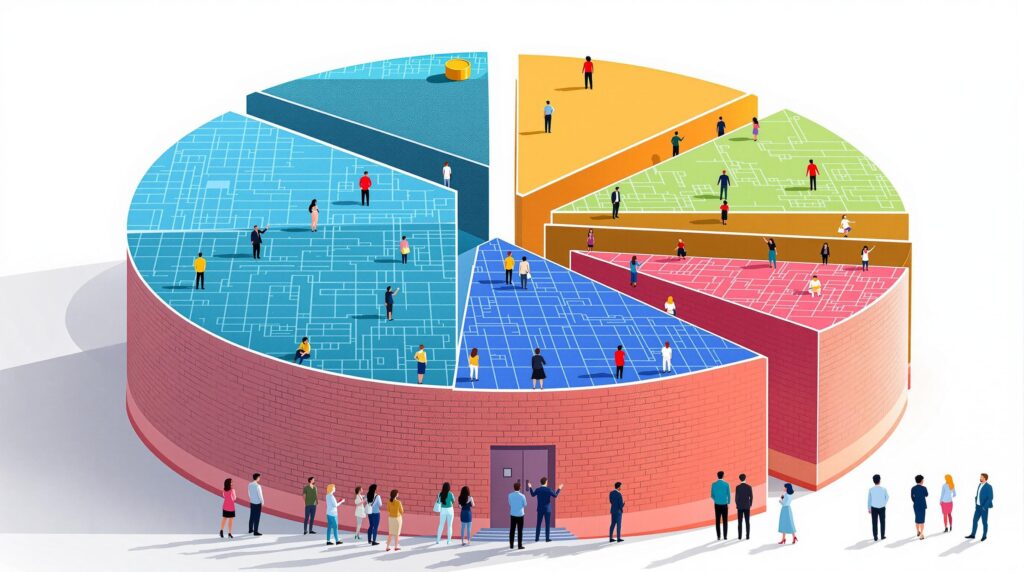Introduction to Smart Contracts in Supply Chains
Ever wondered how smart contracts are reshaping supply chains? Well, these amazing digital contracts are transforming the way supply chains function by enhancing transparency and cutting through inefficiencies. Let’s dive into what smart contracts are all about and explore how they automate operations, ensuring each transaction is securely recorded on an immutable ledger accessible to everyone in the network.
What is a smart contract? A smart contract is a self-executing digital contract written in code and stored on a blockchain, executing predefined actions once agreed conditions are met.
Unlike traditional contracts that require intermediaries, smart contracts operate in an automated and trustless environment. They execute tasks across the supply chain without the need for human intervention, bridging the communication gap between various stakeholders. Each step in the process is automatically verified and documented, ensuring no discrepancies can sneak in unnoticed. To truly appreciate smart contracts’ role in improving supply chain transparency, we must first understand their fundamental nature.
Breaking Down the Basics of Smart Contracts
Smart contracts are written in blockchain-specific languages such as Solidity (for Ethereum) and execute when specific conditions coded into them are met. Imagine having a digital helper that ensures every agreement is fulfilled exactly as per the terms set, without anyone ever missing a beat!
Take, for example, the food safety industry, which benefits significantly from blockchain’s ability to trace products’ journeys through supply chains in real-time. Each product movement is documented in a block, tracking from source to destination, and providing a clear lineage for each piece of inventory.
Smart contracts usher in a new era of operational efficiency by ensuring that compliance, record-keeping, and communication protocols are adhered to in a consistent manner. With real-time updates and verifiable records, the level of transparency these contracts afford is unmatched in traditional systems. So, how do smart contracts improve supply chains?
How do smart contracts improve supply chains? Smart contracts improve supply chains by enabling automated, transparent, and secure transactions that build trust and eliminate inefficiencies.
Furthermore, because these digital agreements are coded directly onto the blockchain, the chance of fraud is significantly reduced. Employing blockchain technology makes it nearly impossible to alter or falsify records without being detected, thus offering an additional layer of security.
The Role of Smart Contracts in Revolutionizing Supply Chain Management
Imagine the revolutionary potential smart contracts hold for various industries. Whether it’s making transactions in DeFi more secure or managing logistics for vast supply chains, adopting these digital agreements leads to significant advancements in efficiency and transparency. The integration of smart contracts and blockchain technology not only simplifies but also stabilizes supply chain processes, making it the quintessential element in evolving global logistics management.
Imagine a world where every step of a product’s journey is crystal clear, where transparency is no longer just a buzzword but a reality. That’s exactly what smart contracts offer for supply chains, especially when integrated with blockchain technology. In Africa and beyond, where the demand for transparency and traceability is soaring, smart contracts serve as the backbone of a revolutionized supply chain.
“Jara- Unlocking the Future to Africa’s Crypto Ecosystem through unparalleled transparency and asset tokenization.” – Bringing trust and reliability into the digital and physical supply chains.
By leveraging smart contracts, each stage of product movement is meticulously recorded in real time. This not only enhances traceability but also provides significant advantages, such as improved product provenance. This offers peace of mind to consumers by allowing them to track the origins of products at any given time. Consider the impact this has in industries with stringent requirements like pharmaceuticals, where verifying product authenticity can be a matter of life or death.
What is product provenance? Product provenance is the record of a product’s history, providing assurance of its authenticity and ethical sourcing. It is especially crucial for businesses that prioritize transparency and sustainability.
When it comes to supply chain disruptions, whether due to recalls or fraud, smart contracts offer a quick resolution tool. Imagine quickly identifying a defective batch of goods and tracing them back to the source in seconds. That’s the power of real-time tracking—faster than finding a needle in a haystack, right?
Why is this more relevant now than ever? As the African digital economy burgeons, the need for transparent supply chain management becomes increasingly critical. Products such as $JARA—a token fueling Africa’s growth—highlight the necessity of smart contracts to verify and track the digital economy’s contributions.
In essence, smart contracts are not just a luxury but a necessity for future-forward businesses aiming to stay competitive. Whether it’s preventing fraud or increasing efficiency, the verifiable nature of blockchain technology combined with automated smart contracts ensures a secure, transparent environment for all stakeholders involved.
Take a moment to envision a future where your favorite African coffee brand lets you trace every bean’s journey from the farm to your cup, thanks to the use of blockchain technology. Wouldn’t you want to be a part of that revolution?
Practical Applications and Industry Impacts
In the fast-paced world of supply chain management, the integration of smart contracts represents a significant turning point. These digital agreements work tirelessly to reduce fraud and enhance efficiency, bringing unparalleled transparency to processes that were once enveloped in complexity and paperwork. Imagine a world where every transaction is not only transparent but also tamper-proof—this is the world that smart contracts aim to create.
Smart contracts operate on blockchain technology, which is inherently secure and immutable. But how do these contracts actually prevent fraud? Let’s delve into it. Each transaction processed through a smart contract is recorded on a blockchain, rendering the data unchangeable once it has been written. Any attempt to alter or fabricate information becomes highly visible across the network, thereby deterring fraudulent activities.
What are smart contracts? Smart contracts are automated, self-executing contracts with the terms of the agreement directly written into code. They execute actions automatically when specified conditions are met, ensuring absolute precision and mitigating the risk of errors or fraud.
For example, consider a supply chain fraud scenario where a party might attempt to manipulate delivery times to falsely claim earlier completion dates. With smart contracts, the delivery confirmation is automatically recorded upon receipt, and the timestamp is distributed across the blockchain network. If someone tries to alter the delivery time, the discrepancy becomes immediately apparent to every stakeholder, making fraudulent claims easy to identify and address.
Benefits of Smart Contracts in Enhancing Traceability
Real-Time Tracking and Provenance
One significant advantage of smart contracts is their ability to provide real-time tracking of products, ensuring traceability and provenance. By leveraging blockchain technology, Jara facilitates the documentation of supply chain data, offering unmatched transparency throughout the product lifecycle.
What is traceability? Traceability refers to the ability to track every stage of the product’s journey through the supply chain, ensuring that each step is documented and verifiable.
Imagine knowing exactly where your coffee originates or how your smartphone components were ethically sourced. This level of detail is possible with the integration of smart contracts, which automatically record and store data on an immutable blockchain. Each participant in the supply chain, from manufacturers to retailers, has access to the same verifiable data, reducing discrepancies and fostering trust.
“Jara- Unlocking the Future to Africa’s Crypto Ecosystem through unparalleled transparency and asset tokenization.”
So, how does Jara contribute to improving supply chain transparency? The Jara platform is designed to align with Africa’s burgeoning digital economy, supporting the seamless flow of goods and information. By utilizing the $JARA token, participants can engage in a wide range of ecosystem activities, contributing to a secure, traceable, and efficient supply chain.
- Enhanced Security: The use of blockchain technology ensures that data cannot be altered once entered, vastly minimizing the risk of fraud and enhancing product safety.
- Increased Efficiency: Automated processes mean that compliance and verification happen in real time, cutting down administration time and reducing human error.
- Seamless Integration: Jara’s digital infrastructure integrates flawlessly with existing platforms, allowing for legally binding automated contracts that are recognized and respected across various jurisdictions.
Consider the benefits to African industries like agriculture and manufacturing, where knowing a product’s origin is crucial for quality assurance and market competitiveness. By ensuring every transaction is logged on a blockchain, Jara enhances the visibility and accountability of regional supply chains. This level of transparency is invaluable in sectors requiring rigorous standards, such as pharmaceuticals and food production.
The incorporation of smart contracts into supply chains represents a significant shift toward a more transparent and reliable business model. Jara’s role in this digital revolution not only strengthens supply chain processes but also builds a robust framework for economic growth within Africa. As real-time tracking expands, the integrity of the product journey is preserved, and consumer confidence is bolstered, enriching both local and global economies.

Improving Efficiency and Reducing Fraud
By automating essential processes, smart contracts reduce human error and the potential for fraud, leading to improved efficiency. These digital contracts act like an automatic gearshift in a car, smoothly transitioning from one task to the next without requiring manual intervention. This automation is key to streamlining operations by ensuring transactions are executed instantly and accurately when predefined conditions are met.
How do smart contracts work? Smart contracts are self-executing contracts with the terms directly written into code, automatically executing actions when specified conditions are met.
Traditional supply chains often resemble a game of broken telephone, where information can get distorted as it passes through multiple intermediaries. This is where blockchain technology through smart contracts becomes transformative. By securely recording each transaction on a decentralized ledger, these contracts eliminate discrepancies and significantly reduce the chances of fraud.
Consider the scenario in which a supplier tries to modify delivery records to claim a speedy shipment. In a traditional system, such changes might go unnoticed, but with smart contracts, any alteration becomes apparent across all stakeholders involved in the blockchain. This transparent system builds trust and minimizes conflicts amongst parties.
- Automated Validation: Transactions are automatically validated, reducing the need for manual checks and intermediate approvals.
- Immutable Records: Once entered on the blockchain, records cannot be altered, ensuring data integrity and security.
- Real-Time Monitoring: Smart contracts provide real-time updates on transaction statuses, enabling quicker responses to issues.
“Jara – Unlocking the Future to Africa’s Crypto Ecosystem,” where transparency meets efficiency in every transaction.
Within Africa’s growing digital economy, companies like Jara are at the forefront, leveraging smart contracts to enhance transparency in their operations. By bridging global capital with African assets, they are not just improving logistics but are also ensuring that the Jara ecosystem operates with unparalleled efficiency and reduced risk.
Through the power of smart contracts, the likelihood of errors and fraud can be dramatically decreased, creating a secure, reliable chain of custody for all assets involved. As the African landscape continues to evolve with digital advancements, smart contracts hold the promise of revolutionizing the way supply chains work, making operations smoother and outcomes more predictable.
| Benefits of Smart Contracts | Details |
|---|---|
| Fraud Reduction | Data immutability and transparency help deter and detect fraudulent activities. |
| Efficiency Gains | Automated processes streamline supply chain operations, reducing delays. |
| Cost Savings | By minimizing errors and manual interventions, operational costs are lowered. |
By adopting a smart contract framework, businesses can benefit from reduced transactional friction and increased trust across supply chains. This technology not only secures the interests of every party involved but also paves the way for sustainable growth and innovation in African markets.
This content enhances understanding of how smart contracts improve efficiency and reduce fraud in supply chains, with specific relevance to the African context. Links are integrated for a cohesive flow, aiming to boost SEO and reader engagement.
Tackling Implementation Challenges
Overcoming Technical and Integration Barriers
While smart contracts offer numerous benefits, integrating them into existing systems presents significant challenges. These challenges stem from the technological complexities and the need for seamless integration into pre-existing supply chain infrastructures. Let’s explore these hurdles and the strategies to overcome them, ensuring successful implementation of smart contracts in supply chains.
What are smart contracts? Smart contracts are self-executing digital contracts stored on a blockchain, which execute predefined actions once agreed conditions are met.
One of the most pressing barriers is the technological complexity involved in creating and deploying smart contracts. Unlike traditional contracts, these digital agreements are coded in blockchain-specific languages such as Solidity, requiring skilled developers who can accurately translate legal agreements into code. This can be a daunting task, particularly for companies new to blockchain technologies.
Furthermore, integration with existing systems is a major hurdle. Many companies still depend on traditional contracts and legacy systems, making the transition to smart contracts costly and time-consuming. To integrate smart contracts effectively, businesses need to upgrade their technology infrastructures and transition their processes to be compatible with blockchain technology.
To tackle these challenges, strategic steps include:
- Upgrading Infrastructure: Investing in modern technology that supports blockchain integration can streamline the process. Companies might explore solutions like cloud-based services that offer flexibility and scalability. An example is investing in a robust API that connects blockchain functionalities with existing ERP systems, ensuring seamless communication.
- Developing Industry Standards: Collaborative efforts within the industry can lead to standardization, making it easier for various systems to interoperate. Establishing clear protocols for data sharing and contract execution facilitates smoother integration across different platforms.
- Upskilling & Hiring: Building a workforce adept in blockchain technology and smart contracts is crucial. Companies should consider training current employees or hiring new talent equipped with specialized skills to handle the technical demands of implementing these digital contracts. Think of it like upgrading from a regular bicycle to a high-tech e-bike—you’ll need the know-how to ride it efficiently.
Moreover, smart contracts must align with existing laws and regulations. Legal frameworks are evolving to incorporate these new technologies, highlighting the importance of ensuring compliance through regular audits and security checks. This reduces risk and builds trust among stakeholders.
“Jara- Unlocking the Future to Africa’s Crypto Ecosystem through unparalleled transparency and asset tokenization.” – Bringing trust and reliability into digital and physical supply chains.
Ultimately, despite the challenges, the potential benefits that smart contracts bring to supply chains are substantial. With the right approach, companies can overcome these barriers, paving the way for more transparent, efficient supply chains that are well-aligned with the digital future. Imagine the pivotal role smart contracts could play in transforming Africa’s burgeoning digital economy, facilitating investment in real assets like the Lagos airport, and fostering global trust and efficiency.
Explore how emerging technological solutions are being harnessed by companies like Jara to address these integration challenges and how they are leading the way in creating a revolutionary supply chain ecosystem. Discover more about Jara’s cutting-edge initiatives that are paving the way for smart contracts in supply chains worldwide.

How do smart contracts enhance supply chain transparency?
Smart contracts enhance supply chain transparency by automating transactions and securely recording them on a blockchain. This ensures that all parties can access an immutable, real-time record of the supply chain process.
What challenges do companies face when implementing smart contracts in supply chains?
The implementation of smart contracts in supply chains can face challenges such as technical integration issues and a lack of industry standards. Companies might need to upgrade their existing technology infrastructures to successfully implement these digital contracts.
Can smart contracts help reduce fraud in supply chains?
Yes, smart contracts can help reduce fraud in supply chains by automating processes and ensuring that all transactions are executed as per predefined conditions, reducing human error and manipulative practices.
Are smart contracts legally binding?
Smart contracts are legally binding if they meet the necessary legal requirements of traditional contracts, which include offer and acceptance, intention to create legal relations, and legality of object.
Are smart contracts legally binding? Indeed, if a smart contract fulfills the traditional legal contract criteria, it can be considered legally enforceable.

Related Practice Areas
Explore additional areas we cover to find the services that best suit your needs.
Discover What Our Clients Are Saying
At the forefront of our Smart Contracts & Automation practice is a deep-seated commitment to client satisfaction. Each case is handled with utmost care, as echoed in the appreciative feedback from those we represent. Stellar reviews are what make us one of Africa’s top-rated Smart Contracts & Automation firms. You can read more 5-star reviews here: Leppard Law Reviews

Join Us in Revolutionizing Supply Chains with Smart Contracts
Are you ready to transform your supply chain operations with the latest advancements in smart contract technology? At Jara, we’re dedicated to bridging global capital with African assets, enhancing transparency and efficiency in supply chains across Africa.
For more information on how our innovative solutions can help your business, visit our website at www.getjara.xyz or connect with us through our mobile apps on Android or iPhone.
“Your supply chain’s transformation is just one smart contract away. Embrace the future with Jara.”
How Smart Contracts Enhance Supply Chain Transparency
Understanding Smart Contracts
Smart contracts are digital agreements that automatically execute when conditions are met. These contracts enhance transparency by documenting every transaction in a supply chain on a blockchain.
Benefits of Using Smart Contracts in Supply Chains
- Enhanced Transparency: Every transaction is recorded on a public ledger, making it easily traceable.
- Increased Efficiency: Automation reduces the time taken to complete tasks that traditionally require manual processing.
- Improved Trust: As data is immutable and verifiable, stakeholders can trust the information, minimizing disputes.
“Through smart contracts, we can witness a revolution in transparency and trust within supply chains, empowering businesses globally.”
Implementing Smart Contracts in Your Business
- Identify Key Areas: Determine which parts of your supply chain can benefit from digital contracts.
- Select a Blockchain Platform: Choose a blockchain that fits your transparency and scalability needs.
- Develop Smart Contracts: Work with developers to create effective, automated agreements tailored to your operations.

















